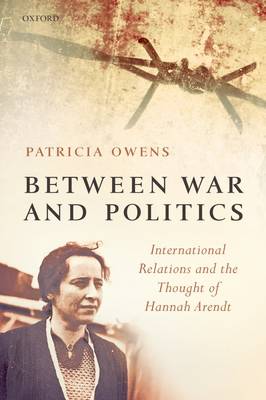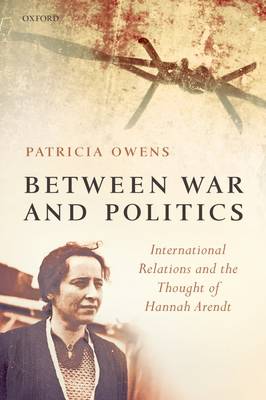
- Retrait gratuit dans votre magasin Club
- 7.000.000 titres dans notre catalogue
- Payer en toute sécurité
- Toujours un magasin près de chez vous
- Retrait gratuit dans votre magasin Club
- 7.000.000 titres dans notre catalogue
- Payer en toute sécurité
- Toujours un magasin près de chez vous
Between War and Politics
International Relations and the Thought of Hannah Arendt
Patricia Owens
Livre broché | Anglais
61,45 €
+ 122 points
Format
Description
Between War and Politics is the first book length study of war in the thought of one of the twentieth-century's most important and original political thinkers. Hannah Arendt's writing was fundamentally rooted in her understanding of war and its political significance. But this element of her work has surprisingly been neglected in international and political theory. This book fills an important gap by assessing the full range of Arendt's historical and conceptual writing on war and introduces to international theory the distinct language she used to talk about war and the political world. It builds on her re-thinking of old concepts such as power, violence, greatness, world, imperialism, evil, hypocrisy and humanity and introduces some that are new to international thought like plurality, action, agonism, natality and political immortality. The issues that Arendt dealt with throughout her life and work continue to shape the political world and her approach to political thinking remains a source of inspiration for those in search of guidance not in what to think but how to think about politics and war. Re-reading Arendt's writing, forged through firsthand experience of occupation and struggles for liberation, political founding and resistance in time of war, reveals a more serious engagement with war than her earlier readers have recognized.
Arendt's political theory makes more sense when it is understood in the context of her thinking about war and we can think about the history and theory of warfare, and international politics, in new ways by thinking with Arendt. This book is a project of the Oxford Leverhulme Programme on the Changing Character of War.
Arendt's political theory makes more sense when it is understood in the context of her thinking about war and we can think about the history and theory of warfare, and international politics, in new ways by thinking with Arendt. This book is a project of the Oxford Leverhulme Programme on the Changing Character of War.
Spécifications
Parties prenantes
- Auteur(s) :
- Editeur:
Contenu
- Nombre de pages :
- 232
- Langue:
- Anglais
Caractéristiques
- EAN:
- 9780199566044
- Date de parution :
- 25-10-09
- Format:
- Livre broché
- Format numérique:
- Trade paperback (VS)
- Dimensions :
- 231 mm x 155 mm
- Poids :
- 380 g







